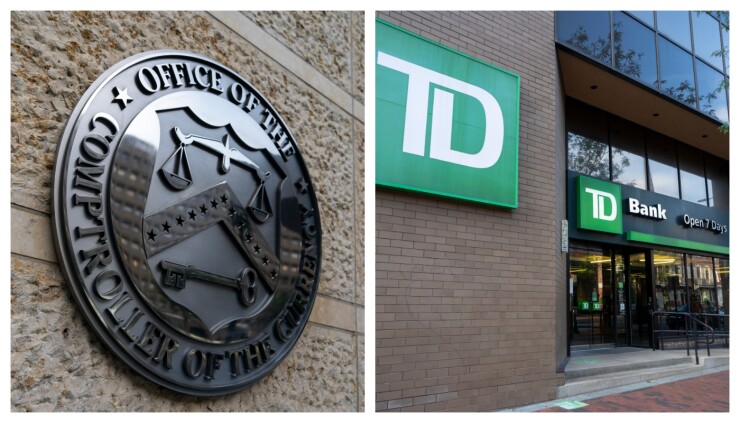
In 1992, Congress tightened certain banking rules as part of its efforts to crack down on money laundering. The new law gave federal regulators the power to revoke a bank's charter when it is convicted of moving dirty money.
Thirty-two years later, the so-called death penalty provision has never been used. In some cases, banks implicated in money laundering have pleaded guilty to alternative crimes, which has averted a regulatory hearing on whether to revoke the bank's charter. In other situations, banks have entered into deferred prosecution agreements with law enforcement, which allow the banks to avoid pleading guilty if they adhere to certain conditions.
TD Bank, which is
But there are reasons why regulators and law enforcement haven't stripped banks of their charters in previous money-laundering cases, and it's unlikely TD will be the first.
The hearing that would be triggered by a criminal conviction for money laundering may lead to bigger problems than those tied to a single bank's risk management, said Daniel Stipano, a partner in the financial institutions practice at Davis Polk & Wardwell.
"If it's a bank of any consequence, that would be very disruptive for the bank, but not just for the bank," Stipano said, speaking about the industry in general and not TD specifically. "If it's a significant enough bank, it could have consequences for the broader financial system and economy."
Stipano, who left the Office of the Comptroller of the Currency in 2016 after working for 30 years on anti-money-laundering rulemaking and enforcement, said he would be surprised if a bank broke from precedent by pleading guilty to money laundering.
Still, the situation presents a double-edged sword to regulators. On one hand, Stipano said it's probably frustrating to the Department of Justice when it puts together a strong money laundering case but instead enters a deferred prosecution agreement or goes for a conviction on lighter charges to avoid jostling the financial system.
On the other hand, regulators and law enforcement have taken heat from politicians in the past when banks' anti-money-laundering programs fail and those banks still don't face the possibility of charter revocation.
Sen. Elizabeth Warren, D-Mass., is already signaling that she'll be watching the resolution of the TD investigation.
"Banks without strong anti-money laundering compliance act as criminal slush funds — and it's dangerous," Warren said Thursday in an email to American Banker. "This isn't the first time that TD Bank has broken the law, and these executives need to be fully prosecuted. Regulators and law enforcement must hold TD Bank accountable for its long history of financial crime."
At a 2013 Senate committee hearing to
And Warren wasn't the only lawmaker who was critical of federal bank regulators after a series of major anti-money-laundering blunders at large banks that didn't result in convictions of any of the banks for money laundering. Key to the hearing was the question of whether regulators, or the DOJ, skirt criminal convictions to avoid hurting the economy.
In 2012, the global bank HSBC, which allowed more than $881 million in Mexican and Colombian drug cartel money to be laundered through the bank and overlooked red flags, entered into a deferred prosecution agreement. Regulators fined HSBC $1.9 billion as part of the agreement, which at the time was the largest-ever penalty assessed against a bank for such charges.
David P. Weber, a former enforcement official at the OCC, the Federal Deposit Insurance Corp. and the Securities and Exchange Commission, is critical of the regulators' hands-off approach with respect to the toolkit that Congress has provided.
Weber, a professor at Salisbury University's Perdue School of Business, called the regulators' track record "kind of outrageous," saying that their reluctance to use "capital punishment of corporate entities" stems from "the fear that it's going to put people out of work."
TD expects to face more than $3 billion in monetary penalties for botched anti-money-laundering controls that
The bank has previously disclosed that it expects a
A spokesperson for Toronto-based TD Bank Group declined to comment for this article.
Over the years, banks that are under the microscope for money laundering have averted regulatory hearings in various ways.
In 2005, Riggs National Bank pleaded guilty to a criminal violation of the Bank Secrecy Act, but by the time the plea deal was finalized, PNC Financial Services Group had already agreed to buy Riggs.
U.S. authorities had found that the former Chilean dictator Augusto Pinochet, who was wanted in several countries for human-rights crimes and whose assets had purportedly been frozen by a Spanish magistrate, deposited more than $10 million into accounts at Riggs.
More recently, U.S. Bancorp entered into a deferred prosecution agreement based on charges that it willfully failed to implement an effective anti-money-laundering program and failed to file suspicious activity reports. The 2018 agreement stemmed from the Minneapolis company's relationship with Scott Tucker, a onetime payday lending baron who had pled guilty to charges including racketeering, wire fraud and money laundering.
Because U.S. Bank's parent company entered into a deferred prosecution agreement rather than pleading guilty, similar to HSBC, it would not have been subject to a charter revocation hearing.
But there's another wrinkle in the law that gives additional wiggle room to prosecutors and regulators. Not every violation of the Bank Secrecy Act prompts a mandatory hearing on the repeal of a bank's charter. In fact, only two specific statutory violations require such a hearing — "laundering of monetary instruments" and "engaging in monetary transactions in property derived from specific unlawful activity."
For guilty pleas on certain other money-laundering-related infractions, such as the failure to file suspicious activity reports, the OCC has discretion on whether to hold charter revocation proceedings. And for guilty pleas on other related charges, such as obstructing a bank examination, the question of whether to revoke the bank's charter doesn't come into play at all.
"Typically the way these things play out in the real world is that it never really comes to this," Stipano said.






